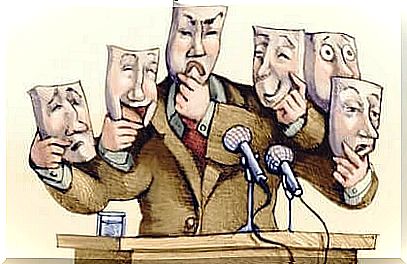Political Stress Syndrome: When Politics Depletes Us

Many people are beginning to experience political stress syndrome. Uncertainty, apathy towards politicians and their messages, tiredness towards internal disputes and, above all, the weight of corruption are increasingly undermining the confidence of all people in the political class. These are situations that, above all, generate many negative emotions such as disgust, disappointment, anger, sadness…
With the genius that characterized him, Jorge Luis Borges said that politicians should not be public figures. This phrase holds a reality that many question.
There are politicians who, because of their behavior, personality or inappropriate decisions, should not be public figures. They don’t set an example, they aren’t a source of inspiration and, on top of that, they aren’t able to be in positions of power.
Nowadays, the chessboard that is world politics is the scene of the most complex movements. We are at the height of extremist sovereignties, independence movements, the dramatic issue of immigration, many cases of corruption, increasingly less socially oriented policies…
Thus, studies such as the one published in Cambridge University Press describe this situation as a spiral of mistrust.
Added to this distrust, we can still add another factor: “infoxication”. That is, intoxication by contaminated information. All these dynamics, information, opinions and news bombard us every day, whether they are true or not, through all means of communication.
Television, radio, social networks, newspapers… Nothing escapes and all of this leads us to reach two different states: indignation or apathy.
The first can lead us to participate in mobilizations, to take an active role, to desire change. The second brings discontent and, very often, the absolute loss of confidence in any political party or option.
Nevertheless, all these experiences stem from a specific reality: the political stress syndrome.

What is Political Stress Syndrome?
Political stress syndrome does not appear in any clinical diagnostic manual. It’s a popular term that has been used for the past few months. An example is this article from the Psychology Today website , in which the author analyzes the impact this fact can have on the child’s mind.
We do not know if this condition will soon appear described in the next DSM – the Diagnostic and Statistical Manual of Mental Disorders, but what we already have clear is that this reality is already a source of analysis for social psychologists and those who study politics.
What’s more, somehow we can even describe what symptoms the political stress syndrome brings. Let’s see in more detail below.
What triggers the political stress syndrome
The anatomy of political stress syndrome is mediated by many different factors. These, in turn, will have a greater impact depending on one’s personality and needs.
However, we will not be wrong to point out that some pillars are almost constant in condition and that are very common to our daily lives today:
- Sensation that the political class cares less and less about its voters and more about its personal interests.
- Policies that favor the richer classes.
- Lack of civility in political speeches. There is no real connection to people.
- Lack of understanding among the political class to reach agreements, to reach an understanding that favors the population and the planet itself.

political uncertainty
These days we all go to bed not knowing what will happen tomorrow. We wake up each day with different news about corruption, wiretapping, threats, denunciations, and worldwide, terrorist attacks and immigrants who lose their lives…
To these facts are added still other issues that are a source of concern to citizens very often. They are related to social policies, such as raising taxes or changes in social security. Politics today places the person in a context of almost absolute unpredictability.
From indignation to helplessness
This factor is very interesting from a psychological point of view. With each scandal, uncovered corruption, legislative decision that harms the population, it is common that, at first, we all feel indignant.
However, little by little comes the day when nothing surprises us anymore, no new facts discovered, no new scandal or damage to public coffers.
Almost without knowing how, a part of the population falls into helplessness. It’s the thought of “there’s nothing to do, things are like that”. Our reaction today in the face of many statements is simply to laugh and remember all the nonsense that has ever been spoken in a joking tone.
We tolerate inconceivable situations of public characters because it simply seems that there is no solution, that it is impossible for us to be represented with dignity.

How to deal with political stress syndrome?
This is not a new topic. We understand that this type of phenomenon is common at certain moments in political life. They have happened several times throughout history and are likely to keep repeating themselves.
However, today we have one more element that until then was not so present, and that makes the impact stronger. So we ended up reaching the extreme of political stress syndrome.
We are talking about the media and the infinite amount of information, viral news, fake news, turning on the television and always seeing exactly the same themes repeated millions of times. What can we do about this phenomenon that affects us so daily?
- The most important thing is never to fall into helplessness.
- As with stress, there is no point in remaining quiet and passive in the face of stressful elements.
- In this way, we will further intensify the malaise. The key is to control exposure. Limit yourself to just seeing or reading enough. Be concerned about receiving truthful information and never lose your critical sense.
Feeling unhappy with the current political situation is fair, respectable and understandable. However, if we fall into helplessness and passivity, we will allow the situation to become chronic.
Activism, participation in public affairs, is perhaps one of the most valuable rights of citizens, even if this value is for all that it cost so many people to have it guaranteed. Politicians are our representatives only insofar as we elect them.
The problem arises when the politician wants to take advantage of his position to deceive the society that placed him in that privileged place. On the other hand, the problem may disappear when society learns to act to banish those who have betrayed it.









